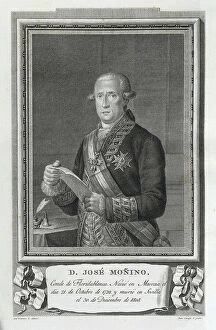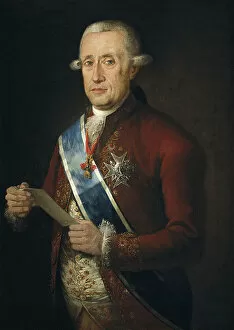Floridablanca Collection
"Floridablanca: A Spanish Statesman and Influential Figure in the 18th Century" Jose Monino, Count of Floridablanca
All Professionally Made to Order for Quick Shipping
"Floridablanca: A Spanish Statesman and Influential Figure in the 18th Century" Jose Monino, Count of Floridablanca, was a prominent Spanish statesman who served as the Minister of Charles III. His portrait, painted by Francisco Folc y Cardona in 1783, captures his dignified presence and intelligence. This oil on canvas masterpiece can be found at the Royal Museum of Painting and Sculpture, also known as the Prado Museum. Born in 1728, Jose Monino Earl played a significant role in shaping Spain's political landscape during his time. He was not only a skilled diplomat but also an accomplished administrator. In fact, he designed the Prado Museum itself – a testament to his multifaceted talents. The count's influence extended beyond politics and art; he even left his mark on Spain's postal system. An intriguing map from the 18th century showcases this innovative network that connected various regions under his guidance. Floridablanca's dedication to public service earned him respect throughout Spain. Known for his intellect and strategic thinking, he became one of Charles III's most trusted advisors. His commitment to improving governance led to numerous reforms that benefited both nobles and commoners alike. Despite being remembered primarily for his political achievements, Jose Floridablanca had a profound impact on Spanish society as well. His policies aimed at promoting economic growth while ensuring social stability resonated with many citizens. Today, we honor the legacy of this remarkable man whose contributions continue to shape our understanding of Spain's history during the 18th century. The Count remains an enduring symbol of leadership and vision – a true statesman whose name will forever be associated with progress and reform.












